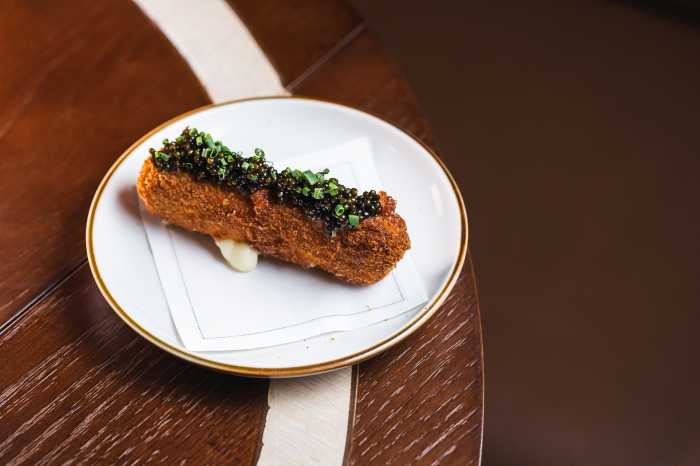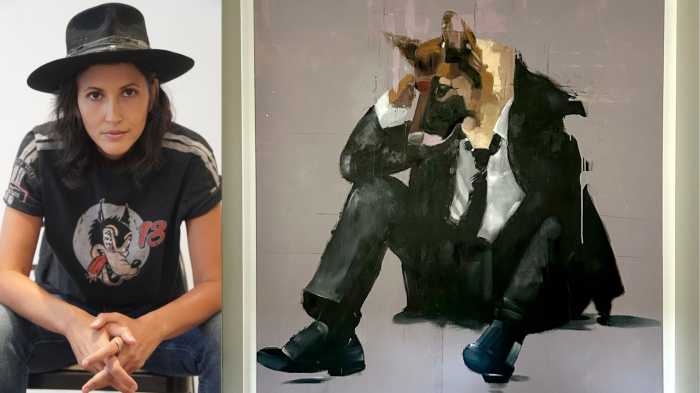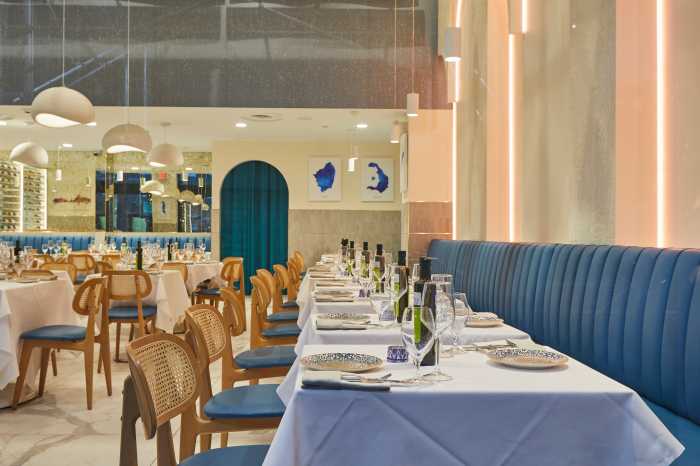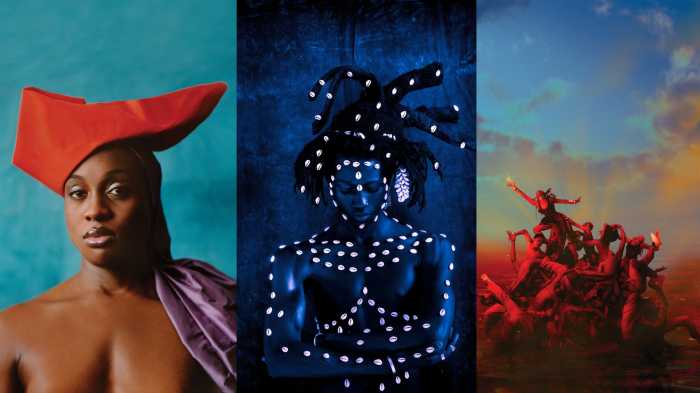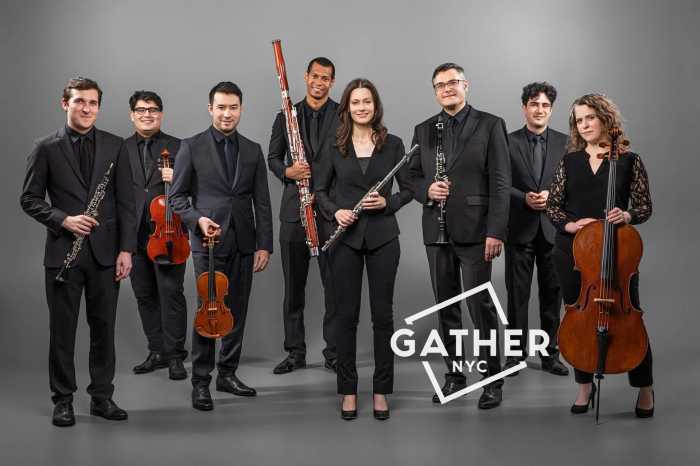By Michele Herman
There’s a puppy in my apartment. I take a lot of breaks from writing, sometimes to play and sometimes just to be sure this puppy I wanted for so many years is really real. At my approach he wags his tail with ardent affection and then leaps with anticipation into an upright position, his big shaggy front paws dangling in front of his skinny little chest. If I form anything resembling a lap, he climbs in, curls up, tucks in his long nose like a duck and falls asleep.
Outside, the world is a worse wreck than ever. The lunatic fringe has stepped to the center ring; Manhattan is selling out its eccentricities lot by lot; my friends’ marriages are floundering. But in my apartment, there’s a puppy, welcoming us into his earthy, strife-free realm. There, the biggest heartbreak is when Megan, his Dachshund girlfriend down the hall, can’t come out to play; the thorniest problem how to dig out that good smell buried deep in the living-room rug. He settled into our family’s realm just as smoothly. He eats when we eat, goes to bed at our boys’ bedtime and has learned to give one discreet bark to be let out of his crate in the morning. He’s so sweet and gentle and goofy he’s worn down most of the considerable resistance of his adoptive father, my husband.
His name is Ruggles (or Rugelach, according to the sensible credo “Think Yiddish, talk British”). He’s a miniature wirehaired Dachshund weighing in at around 6 pounds, with honey-colored face and beard and paws and big floppy velvet ears and black puppy fur on his back, and he’s the dog of my dreams.
Before we got this puppy, delivered to us sight unseen from his first home in western Pennsylvania when the breeder came to the city for the Westminster, I did lots of research. The breeder has been in the business 30 years, has run the Dachshund rescue league, and told me on the phone, “I know my genetics and I breed ’em right.” Though many of my peers treat research like a religious rite, I think that a certain point comes when research fails. Research will never tell you how it will feel to live with a puppy, how your new daily rhythms will play out, whether you’ll really like living with a puppy as much as you liked the idea of it. It was time to jump in.
Word on the street was that a puppy is as much work as another baby. But Ruggles has turned out be far more reasonable than any baby who ever emerged from my loins. He’s not perfect, of course. We find trails of pishy pawprints and the occasional poop on the rug (one of the myriad qualities to recommend the breed is that Dachshund poop is as compact as Dachshunds). No matter how we reprimand him, he’s on a mission to steal the sofa pillows. He’s learned to enlist a toy as accomplice, making it look as if he just happened to leap to the sofa while batting around Hippie Hound, the long-haired squeeze toy he’s loved right down to the stuffing.
When we try to walk him on the leash, he’s apt to tell us he prefers not to, thank you very much. He lies down with his back paws sprawled behind him, permitting his belly to be sanded on the coarse grade of the city sidewalk. The breeder warned us about this. The short-hair Dachshunds can be a little neurotic, the long-hairs gentle but needy, and the wires — the wires, she said, and I could hear the appreciation in her voice, are mischievous and they don’t really care all that much about what you think.
Bless Emma Jean the breeder, who delivered one great puppy. He arrived paper trained, and after my first dutiful early-morning venture in the cold and dark to get him to switch his habits to the outdoors, I asked myself the logical question: what are you, crazy? Go back in and keep using the papers. We got a puppy who waits patiently for his food and who never begs, a puppy who doesn’t play favorites and who’s fearless enough to march up to the grouchiest looking bulldog in the West Village and give its rear end a good sniff. About an hour of each day is spent thoroughly kissing our boys’ faces and fingers and toes.
Something my research didn’t tell me was how much I would enjoy my training duties. After being a mother to humans, what a treat to do all that un-P.C. pre-Penelope Leach stuff. Finally I get to emulate my father’s authoritarian 1950s parenting style! I don’t have to praise the puppy’s process over his product like my boys’ good nursery-school teachers. When Ruggles is naughty, we say “bad dog” and when he gets something right we coo “good sit!” or “good stay!” “No,” we say, in no uncertain terms, “we don’t eat pigeon poop. We don’t lick the kitchen floor.” No explanation necessary, except this: because I’m the alpha dog and I said so. I also get to tell him he’s adorable, cute, a doll face, a sweetie pie a hundred times a day and he never gets a swelled head.
Another pleasure I didn’t anticipate was that wagging tail, like a permanent kinetic hindquarter grin. Every household should have one. And now that he’s beginning to get on board with the walks, I’m finding the tug of the leash irresistible, as satisfying as learning to work a clutch and stick shift. There’s tension between us, but it’s that rare kind of tension that feels just right; we’re a team.
With the new puppy in the apartment, the tally of bearded creatures around me grows: we have one bearded puppy, one Australian bearded dragon, one bearded husband and two smooth-faced but rapidly growing boys. And our community, already quite full, grows again. Our playground days have ended, but our dog-run years have just begun, with a whole new cast of characters to learn. Right on our hallway, Ruggles already has a standing play date with Danny the Westie and the aforementioned Megan. He’s still working out terms with our beloved Sandy and Ginger the huge Wheatens down the hall, who aren’t yet sure they approve of the brazen midget interloper.
Now, as I type, there’s a puppy in my lap. I don’t remember exactly how he got here — probably by sheer insinuation. He’s in his duck position, lying in a patch of early-spring sun coming into the window, sun we will lose if the massive glass-and-metal high rise gets built next door. It’s a mess out there, but in here, it couldn’t be warmer or friendlier.



